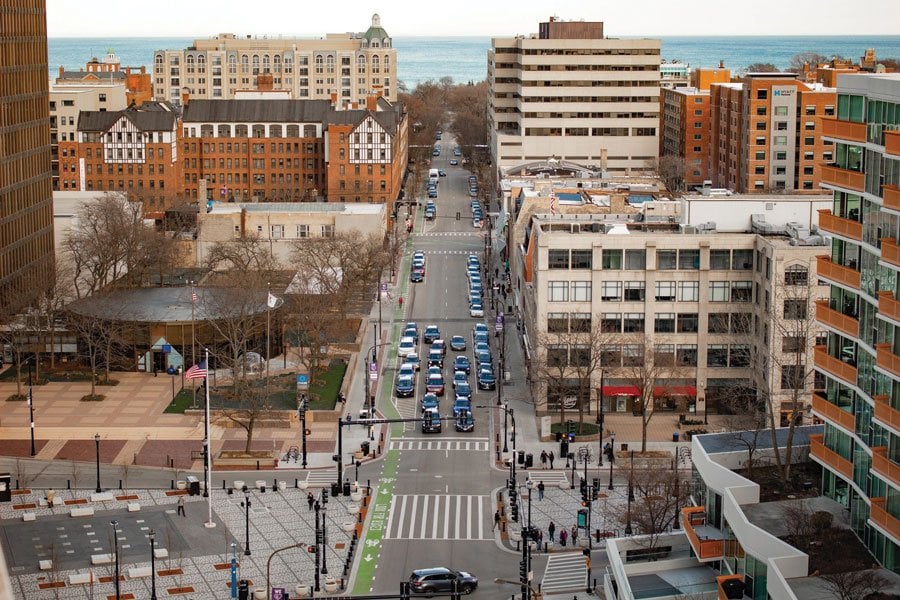Schill intends to continue Good Neighbor Fund, make Ryan Field a ‘win-win’ for Evanston and NU
Daily file photo by Evan Robinson-Johnson
Northwestern President Michael Schill said he plans to continue the school’s Good Neighbor Fund, which has granted $1 million to the city of Evanston each year since 2015.
October 16, 2022
Since University President Michael Schill took over in September, debates about mental health response programs, parking congestion and Northwestern’s Ryan Field rebuild have dominated conversation among Evanston’s leadership.
While Schill has not announced new financial partnerships with the city, he told The Daily he plans to continue working with Evanston to advance the city’s social and economic goals. Schill intends to continue the University’s Good Neighbor Fund, which has granted $1 million annually to the city since 2015.
“Evanston is very important to us, so I want to be a strong neighbor,” Schill said. “We are going to find a number of ways to work with them… we are incredibly important to the economy of Evanston.”
Schill comes to NU having served for seven years as president of the University of Oregon. During his tenure, the university forged several partnerships with the UO’s home city of Eugene.
In March, UO announced it will establish an institute to address children’s behavioral health. Similarly, Evanston leaders have been working in recent months to address a lack of comprehensive mental healthcare in the city.
Evanston has partnered with Trilogy Behavioral Healthcare to provide a 24/7 mental healthcare crisis response hotline and is also in the process of opening a “Living Room,” a no-cost walk-in and call-in resource center for adults experiencing mental health crises.
Still, some experts have said there are not enough local resources for children experiencing mental health crises — and Schill has expressed similar sentiments in Eugene
“A bold effort is needed to address the behavioral and mental health needs of our youth,” Schill said in March of UO’s partnership with the city.
Though Schill has not announced any plans to invest in Evanston’s mental health resource landscape, Mayor Daniel Biss said he is excited about the background that Schill brings to tackling issues like mental health.
Biss said he is excited to work with Schill toward their shared goals, such as expanding adequate affordable housing.
Schill has authored three books and several articles focused on real estate, housing policy and discrimination in the housing market. He has written a casebook, “Property,” which explores real estate and housing policy.
“As the city strives to become more affordable, sustainable, and equitable, I see partnership with Northwestern as a critical piece of the puzzle,” Biss told The Daily in an email. “It’s particularly encouraging that affordable housing, an absolutely essential need for our community, is so central to President Schill’s academic work.”
Dave Davis, executive director of Neighborhood and Community Relations at NU, said Schill hopes to help the city further its affordable housing initiatives.
“Affordable housing… continues to rank high as one of the top issues facing Evanston residents,” Davis said. “(Schill’s) expertise in affordable housing and land use makes him well suited to tackle one of the most pressing issues of our time, especially here in Evanston.”
Schill said investing in a long-term relationship between the 7th Ward and NU is also high on his list, given plans to rebuild Ryan Field, NU’s football stadium, over the next few years.
In a 7th Ward meeting Wednesday, residents expressed their concerns about the facility’s potential to increase noise and light pollution in the area and worsen parking congestion. NU plans to host concerts and other speaker events at the stadium once it is rebuilt.
NU officials said they have hired a traffic engineering firm to look into potential congestion issues and create a parking plan for game days. They also said the project will generate 2,900 new jobs during the rebuild and more than $10 million in direct fees to Evanston.
“We’re working deeply with the community,” Schill said. “We’ve already started talking about that, trying to make Ryan feel like a win-win.”
Working with city officials for major construction projects is not new for Schill: UO is also currently coordinating with Eugene to establish a new football practice facility. Schill helped authorize a land swap with Eugene, an exchange of land between two parties, which ultimately passed after he left the university.
Schill hopes to achieve a similar collaboration between Evanston and NU while Ryan Field is being rebuilt.
“It will be an incredible stadium, and we want the community around Ryan to be supportive about it,” Schill said. “We have to make Ryan field something that creates benefits for the community.”
Email: [email protected]
Twitter: @Avanidkalra
Related Stories:
— Daniel Biss discusses policing, racial equity and town-gown relations in Northwestern forum
— Mayoral candidates discuss policing, town-gown relations at debate


